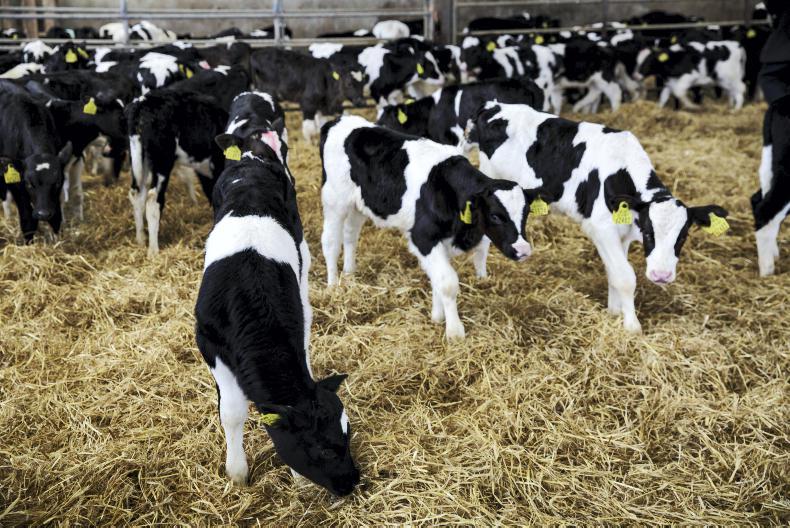The Department of Agriculture, Food and the Marine (DAFM) is advising farmers to delay selling calves until live calf exports resume normal activity.
A circular released on Thursday morning stated: “The disruption of this trade may lead to reduced demand for calves at marts over the coming week. In order to ensure welfare of calves, DAFM advises that dairy farmers make every effort to retain calves on farm for an additional number of days until the weather conditions allow for the resumption of this trade.”
Storm Ciara has prevented calves from being exported live this week. There is more adverse weather forecast, with storm Dennis set to hit Ireland over the weekend.
As a result, the Department says it is likely that there will not be any movements until the middle of next week.
As reported in this week’s paper by Paul Mooney, there is a significant backlog of calves in exporters' yards and these will need to be cleared before exporters return to purchase calves from marts and direct off farms.
This has had a significant effect on price, with some marts reporting calf prices slipping by €20 to €30 on the previous week’s level.
Export figures
Farmers will be hoping the disruption is short-lived, with the peak trading period about to commence.
As Figure 1 demonstrates, the number of calves exported in the week corresponding to this week in 2019 was recorded at 6,135 head, with this jumping to 10,508 head in the following week.
This means there will be pressure on exporters to maximise the number of trucks on sailings, which should be possible given that exports generally do not reach peak capacity for another two to three weeks.
The number of calves exported to the week ending 9 February 2020 is running at 3,646 head, a reduction of 3,013 head on the first six weeks in 2019.
Demand for calves in Spain has been described as firm, while appetite in the Dutch market appears also to be strong.
The main trading period for calves travelling to the Netherlands is from February through to mid-May, as this coincides with white and rosé veal production and targeting production for the Christmas market.
Read more
Storm Dennis to bring heavy rain and high winds
Rough seas prevent calf ferry sailings
Can calf exports hit 200,000 head again in 2020?
The Department of Agriculture, Food and the Marine (DAFM) is advising farmers to delay selling calves until live calf exports resume normal activity.
A circular released on Thursday morning stated: “The disruption of this trade may lead to reduced demand for calves at marts over the coming week. In order to ensure welfare of calves, DAFM advises that dairy farmers make every effort to retain calves on farm for an additional number of days until the weather conditions allow for the resumption of this trade.”
Storm Ciara has prevented calves from being exported live this week. There is more adverse weather forecast, with storm Dennis set to hit Ireland over the weekend.
As a result, the Department says it is likely that there will not be any movements until the middle of next week.
As reported in this week’s paper by Paul Mooney, there is a significant backlog of calves in exporters' yards and these will need to be cleared before exporters return to purchase calves from marts and direct off farms.
This has had a significant effect on price, with some marts reporting calf prices slipping by €20 to €30 on the previous week’s level.
Export figures
Farmers will be hoping the disruption is short-lived, with the peak trading period about to commence.
As Figure 1 demonstrates, the number of calves exported in the week corresponding to this week in 2019 was recorded at 6,135 head, with this jumping to 10,508 head in the following week.
This means there will be pressure on exporters to maximise the number of trucks on sailings, which should be possible given that exports generally do not reach peak capacity for another two to three weeks.
The number of calves exported to the week ending 9 February 2020 is running at 3,646 head, a reduction of 3,013 head on the first six weeks in 2019.
Demand for calves in Spain has been described as firm, while appetite in the Dutch market appears also to be strong.
The main trading period for calves travelling to the Netherlands is from February through to mid-May, as this coincides with white and rosé veal production and targeting production for the Christmas market.
Read more
Storm Dennis to bring heavy rain and high winds
Rough seas prevent calf ferry sailings
Can calf exports hit 200,000 head again in 2020?






 This is a subscriber-only article
This is a subscriber-only article










SHARING OPTIONS: